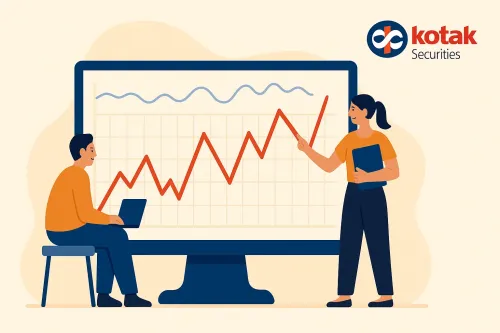Why is the Indian stock market falling despite strong Q3 2025 GDP growth?
- 4 min read•
- 1,476•
- Published 18 Dec 2025

The Indian share market has been in a downward cycle in the initial months of 2025, showing steep volatility and correction. This comes even as India's economy recorded a GDP growth of 6.2% in Q3 2025, as per market expectations. Stocks have, however, kept falling amid world uncertainties.
Index levels Sensex and Nifty are both down more than 10% from their highs in January 2025. The mid-cap and small-cap indices have fared worse, with drops of as much as 25% from highs. Now, this sustained weakness has left many investors bewildered, especially since GDP growth for Q3 2025 was a decent 6.2%.
Although this rate of growth was in line with expectations, it represented a discernible slowing from the 8.6% growth during Q3 2024. The slowdown, combined with the unstable performance of the stock market, indicates a number of underlying issues affecting investor sentiment.
Global trade tensions
The US's aggressive trade policies have generated uncertainty in financial markets across the world. The imposition of tariffs on Mexican and Canadian imports from March 4, 2025, and doubling the current 10% universal import tariff on Chinese products has raised fears of a full-blown trade war.
In India, the costs linked to such protectionist policies will be felt most in sectors where there is active US exporting like IT and Pharma. Although emerging economies like India are not the direct targets of US foreign trade policies, the interruptions in global trade and supply chains will definitely affect them.
Foreign Institutional Investor (FII) outflows
Foreign portfolio investors have been actively dumping Indian stocks since late 2024. In February 2025 alone, FIIs pulled out Rs 11,639 crore in a single day, accounting for over half of that week's total outflow of Rs 22,011 crore.
This relentless FII selling has been the driving force behind the market's recent correction. Statistics reveal that foreign investors offloaded an astonishing $29 billion worth of Indian shares during a five-month period up to February 2025. By exacerbating the downward momentum, the FII exodus has been a key driver behind the market's bearish sentiment.
Valuation concerns
The Indian market also continues to grapple with steep valuation levels, even after the significant correction. As of February 2025, India's total market capitalisation as a percentage of GDP stood at 114.46%. This is as per the Buffett Indicator, which signals the market is modestly overvalued at current levels.
The rich valuations have made investors wary, especially regarding mid-cap and small-cap shares. These had witnessed huge upsides during previous rallies, resulting in overbought conditions. Investor demand has cooled considerably now that the market is perceived as trading above fair value.
Economic growth slowdown
India's Q3 FY 2025 GDP growth of 6.2% met estimates but represented a considerable decline from the 8.6% expansion in Q3 FY 2024. Adding to the concerns, the Ministry of Statistics & Programme Implementation forecasted full-year FY 2025 GDP growth at just 6.4%.
This would be the lowest annual growth rate in four years. The disappointing projections have raised doubts among investors regarding the short-term trajectory of the country's economic growth. This outlook of moderating growth has dampened overall market sentiment.
Rising oil prices and dollar strength
Crude oil prices have gone up to three-week highs in recent times. Normally, elevated crude prices worsen India's current account deficit and fuel inflationary pressures. This negative macroeconomic effect tends to weigh on the equity market's performance.
Simultaneously, the US dollar index and treasury yields have increased. This has made emerging markets such as India relatively less attractive to international investors. It has also caused capital flows out of these markets as funds shifted back into dollar-based assets.
The combination of higher crude prices and a rising dollar has hurt the Indian equity market by enhancing the risk perception and provoking foreign investor sell-offs.
Reasons for optimism
Although the challenges persist, there have been occasional periods of recovery too. In March 2025, the market saw a sharp rebound, with investors going on a bargain-hunting spree following the sharp correction.
Bettering local macroeconomic indicators also offered some relief. In addition, favourable valuations following the sell-off lured investors back into some stocks. Yet experts have cautioned that the sustainability of such relief rallies remains questionable in the face of global uncertainty.
Conclusion
India's stock market has slumped over 10% from record highs this year despite 6.2% GDP growth in Q3 2025. Global trade tensions, foreign investor exits, excessive valuations, slowing growth forecasts and rising oil/dollar have all plagued investor sentiment. While economic fundamentals remain stable, fears of a spillover from global protectionism and the FII exodus have driven the risk-off sentiment. But any meaningful advance on the world front could rekindle interest in reasonably priced Indian shares. Investors must follow macro developments closely along with earnings from companies to spot opportunities as they emerge.









